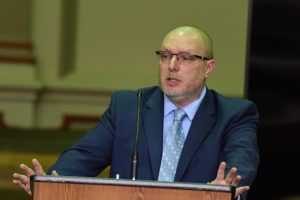Balderson backs bill to expand government telehealth services in the United States
June 26, 2020
Last week, Congressman Troy Balderson (R-OH) introduced bipartisan legislation alongside Congresswoman Cindy Axne (D-IA) to expand telehealth efforts created in response to the COVID-19 Pandemic.
“It’s something that we are both very passionate about with telehealth and making sure that we have access to healthcare for rural areas but also to suburban areas,” said Balderson. “What drove it here, more importantly, was, you know, not being able to go to the hospital, not being able to go to our doctor’s office for this COVID, so being able to do this via telephone or via over the internet, it has just been a true blessing.”
According to Balderson, some of those expanded services include access to mental health care, occupation therapy and speech therapy.
Recently, Balderson spoke with healthcare professionals in his congressional district, including some in Muskingum County.
“They are glad to see that it is moving forward. They’re really excited about it,” said Balderson. “You know, the doctors that were on there were anywhere from neurosurgery to dermatologists, but it’s a vital role. It’s a really important piece.”
Implementing government-backed telehealth services has been something Congress has been working on for a while, Balderson said.
“It was dragging and dragging and with the unfortune of the pandemic, it has accelerated,” said Balderson.
While making in-person visits to a doctor’s office or hospital is still a necessity in some cases, Balderson said staying home to do so has its benefits, especially for those without access to transportation or nearby facilities.
“We need to continue to make sure that we broaden the access for people in the rural counties to get healthcare,” said Balderson.
Another key component to improving telehealth services, according to Balderson, includes expanding rural broadband.
Balderson believes the ability to communicate with doctors remotely might encourage individuals to better monitor their health.
“People are comfortable, too,” said Balderson. “They’re very comfortable staying at their home and not having to go to the doctor’s office.”
In addition to expanded services, the bill also instructs a study to be completed regarding the current usage of telehealth services in the United States.
















Patti Cline • Aug 5, 2020 at 11:56 pm
Telehealth is Horrible. What is all this talk you see and hear concerning looking after people with mental Issues and then the Doctor can’t be bothered to see them in person.
?
Cindy Robson • Jun 26, 2020 at 8:55 pm
I think it is a very impersonal way to discuss your health and have your medical needs met. I am not impressed at all with tele- health.